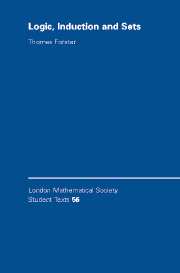4 - Propositional calculus
Published online by Cambridge University Press: 05 June 2012
Summary
So far I have been extremely careful not to say anything about languages that depends in any way on semantics. We are now going to introduce ourselves to two notions in logic that cannot, without perversity, be approached without semantics. They are theory – which is a kind of language, and a logic – which is a kind of theory.
If P is a propositional alphabet containing letters p1, p2 …, then ℒ(P) is to be the language overP: the set of all formulæ like p1 ∨ p2, p3 ∧ ¬p4 and so on, all of whose literals come from P – as in section 2.2.1.
A theory is a set of formulæ closed under deduction, and members of this set are said to be theorems of the theory. What is deduction? This is where semantics enters. Rules of deduction are functions from tuples-of-formulæ to formulæ that preserve something, usually (and in the course of this book exclusively) truth.
But what is truth of a formula? A formula is a piece of syntax. It may be long or short, or ill-formed or well-formed. It can be true or false only with respect to an interpretation. Interpretations in the propositional calculus are simply rows from the things you may know and love as truth-tables: they are functions from literals to truth-values, to {true, false}. Each row in a truth-table is an interpretation of the formula.
Information
- Type
- Chapter
- Information
- Logic, Induction and Sets , pp. 70 - 93Publisher: Cambridge University PressPrint publication year: 2003
